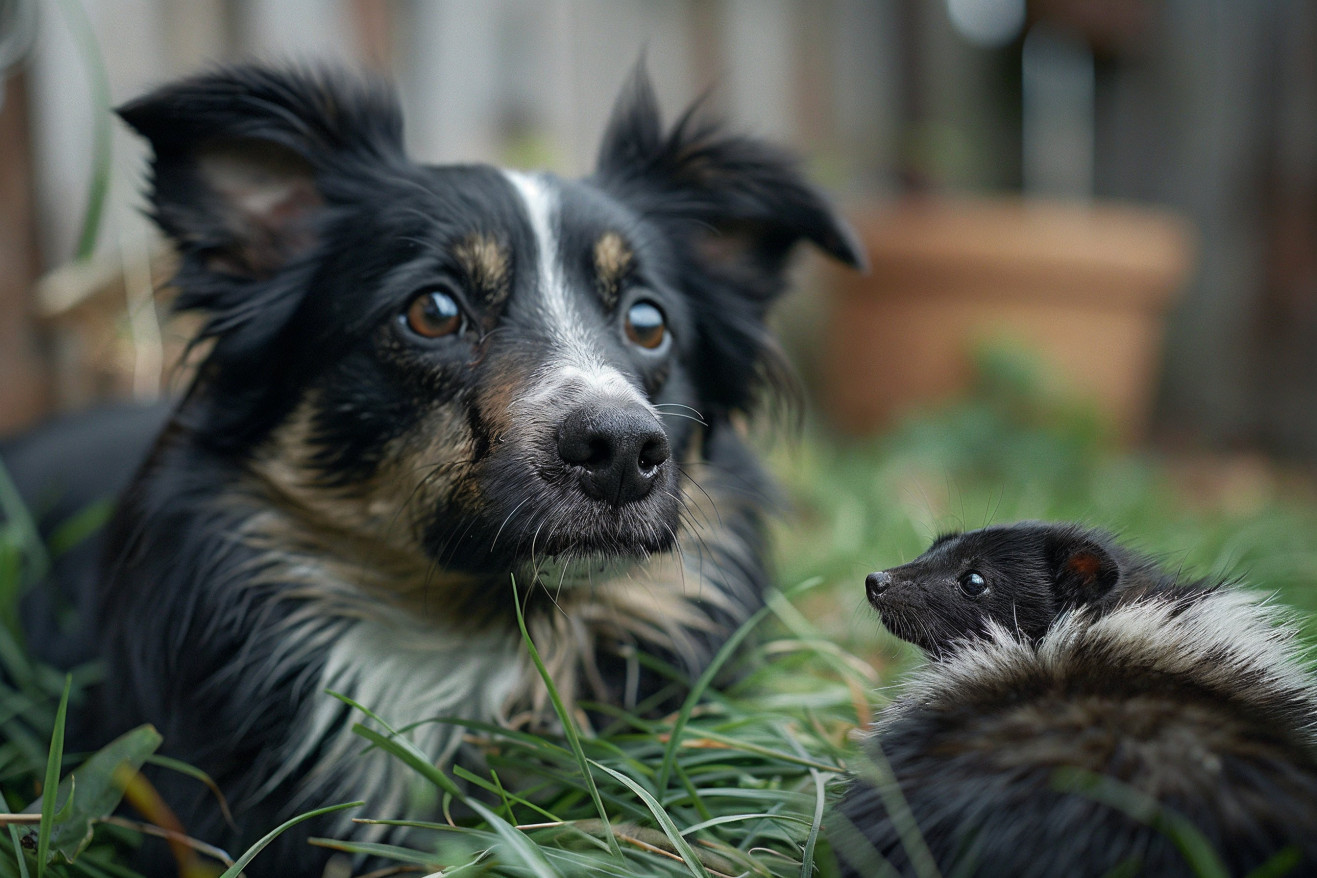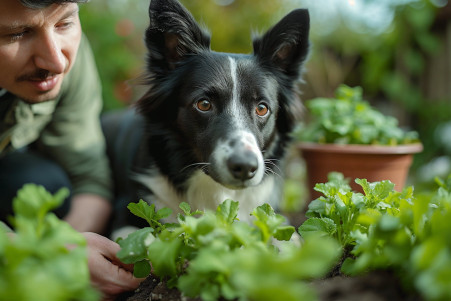Can Skunk Spray Kill a Dog? Unveiling the Risks and Protections
28 February 2024 • Updated 27 February 2024

The infamous skunk spray: just a smelly annoyance, or a silent killer lying in wait for dogs? While it’s not usually deadly, skunk spray can be dangerous for dogs, especially if they’re sprayed in the face or mouth. In these cases, the dog may experience vomiting, diarrhea, and anemia, all of which can be fatal if not treated by a vet.
It’s also important to make sure your dog is up to date on their rabies vaccination.
This article will delve into in-depth veterinary research, toxicology case studies, and animal behavior experiments to determine the impact of skunk spray on dogs. By doing so, we hope to determine the real dangers, stress the importance of immediate care, and find the best solutions for minimizing the potential risks. We’ll also cover how to handle skunk encounters and what you can do to make sure your dog stays safe and healthy.
Can skunk spray kill a dog?
What Makes Skunk Spray So Dangerous?
Far from just a bad smell, skunk spray is a complex mixture of chemicals that can be harmful to dogs. According to NOVA, skunk spray contains volatile sulfur-containing thiols, which are largely responsible for its terrible smell. When these thiols come into contact with water, they turn into even more powerful substances, which is why the smell can be so hard to get rid of.
In addition to making dogs stink, skunk spray can also make them sick. According to DVM360, skunk spray toxicosis can cause a number of symptoms, including ocular irritation and temporary blindness. In some cases, the toxicity can progress to the point that it causes oxidative damage to red blood cells, leading to Heinz body anemia or methemoglobinemia, both of which can be fatal if they’re not treated.
This is why it’s so important to understand these toxic effects. A study by William F. Wood, which is cited in The Chemical Educator, suggests that the key to successful treatment is understanding the chemical nature of skunk spray. Veterinarians who understand the science behind the substance can ensure that dogs receive the most effective treatment, which can help them recover from these dangerous situations.
Summary of Risks and Safety Measures
If your dog has been skunked, it’s important to get them to the vet as soon as possible. According to PetMD, the first thing the vet will do is flush the dog’s eyes and mouth with warm water to help with chemical burns.
The vet will also bathe the dog with a solution of hydrogen peroxide, baking soda, and liquid soap, which is the same solution that Mythbusters found to be most effective and is commonly referred to as baking soda and peroxide.
The recovery period will last a few days, and according to WebMD, the dog’s symptoms, including red eyes and vomiting, will improve with proper cleaning and care. While rare, more serious side effects, such as anemia, will require the dog to be monitored for symptoms like pale gums and weakness.
According to veterinary professionals, including Dr. Jennifer Coates, long-term side effects are rare if the dog receives supportive care and is closely monitored. In general, the treatments are successful as long as they are administered quickly and according to the proper protocols and dosages.
As the smell of the skunk spray wears off and the dog’s memory of the incident fades, they should return to their normal selves and be ready to take on whatever life throws their way.
Understanding the Skunk and Dog Relationship
Skunks are solitary animals that are known to avoid conflict whenever possible. Study.com explains that skunks have a highly effective defense mechanism—releasing a noxious spray when they feel threatened. PAWS describes that skunks will often stomp their feet and take on a certain posture before they spray. These are signs that a skunk is trying to avoid a confrontation.
Dogs, however, can often be the ones to trigger a skunk’s defense mechanism because of their natural curiosity and sometimes exuberant behavior.
While there are no hard and fast statistics on how often dogs get sprayed by skunks, PAWS says that the reason it happens so often is that skunks’ habitats are so widespread throughout the New World. When a dog is sprayed by a skunk, it can lead to behavioral changes, including making them more wary or nervous around other wildlife.
Knowing how skunks and dogs interact is important to avoid negative encounters. By learning to recognize the signs that a skunk is about to spray, people can protect their pets and the skunks and make sure that they can intervene before a dog’s curiosity leads to a smelly situation.
How to Help Dogs Through the Emotional Impact
In addition to the physical discomfort and smell, there is also an emotional impact on dogs who have been sprayed by a skunk. In particular, FamilyPetDoctor notes that the smell can lead to other dogs being aggressive toward the dog that was sprayed because they no longer recognize their scent. This is a clear example of how the smell of a dog can affect their social interactions and mental well-being.
The dog that was sprayed may also experience trauma, which can lead to anxiety and other changes in behavior. As a result, pet owners need to help their dogs through the emotional aftermath of being sprayed by a skunk. This will involve helping them feel safe and secure again, which can be done by giving them extra attention and care.
In addition, it’s important for pet owners to watch their dogs for signs of stress and anxiety and make sure that they are in a safe and stable environment.
In some cases, the animal behaviorists at the UC Davis Behavior Department can help pet owners come up with a plan to help their dogs through the emotional aftermath of being sprayed by a skunk. These professionals can help pet owners understand how to deal with any behavioral changes that result from the skunk spray and make sure that the dog’s emotional well-being is being taken care of in addition to their physical recovery.
As the dog starts to feel better, pet owners will need to help them feel safe and secure in the world again.
Skunk Encounter Prevention: Protecting Your Dog
If you’re a dog owner, there are a number of things you can do to help prevent a skunk encounter.
This includes making sure that your outdoor garbage cans and pet food storage containers are sealed to reduce the likelihood that skunks will be attracted to your property.
You can also make sure that you have cleared away any debris and sealed any vents that could make your home an attractive place for a skunk to nest. Make sure your dog is vaccinated against rabies, which is a common illness that skunks carry; Understanding rabies is underscored as important for pet safety.
It’s also a good idea to make sure that you don’t walk your dog off-leash in wooded areas, especially during the hours of dawn and dusk when skunks are most active. In addition, training your dog to come when called and to avoid wildlife can help prevent encounters.
It’s also important to make sure that dogs are kept indoors during the times of day when skunks are most active and that you don’t leave out food that could attract them.
By taking these steps and promoting responsible pet ownership, you can help reduce the likelihood that your dog will be injured by a skunk. However, it’s also important to remember that part of being a responsible pet owner is creating an environment that is safe for your pet and the wildlife that you and your pet come into contact with.
Final Thoughts: Understanding Skunk Spray Risks for Dogs
While skunk spray is a danger to dogs, it is not typically a life-threatening one. However, the chemicals in skunk spray can cause a great deal of discomfort and potential health problems, especially if they are sprayed directly in a dog’s eyes or mouth. Veterinary care is necessary to effectively treat symptoms and prevent the rare but serious consequence of toxicosis.
The importance of rabies vaccination in protecting dogs from skunk spray and other wildlife hazards is clear. Treatment methods, such as the deodorizing solution used by Mythbusters and the immediate flushing of affected areas, are proven to help with recovery, as noted by PetMD.
Dog owners can help prevent encounters by taking simple steps like securing food and managing habitats. By learning about skunk habits and taking preventive measures, dog owners can get through these encounters with as little impact on their pets as possible.
In summary, while a skunk’s defense mechanism can be scary, dog owners who are informed and prepared can handle these situations in ways that are safe and compassionate to their pets and the wildlife we share our world with.


